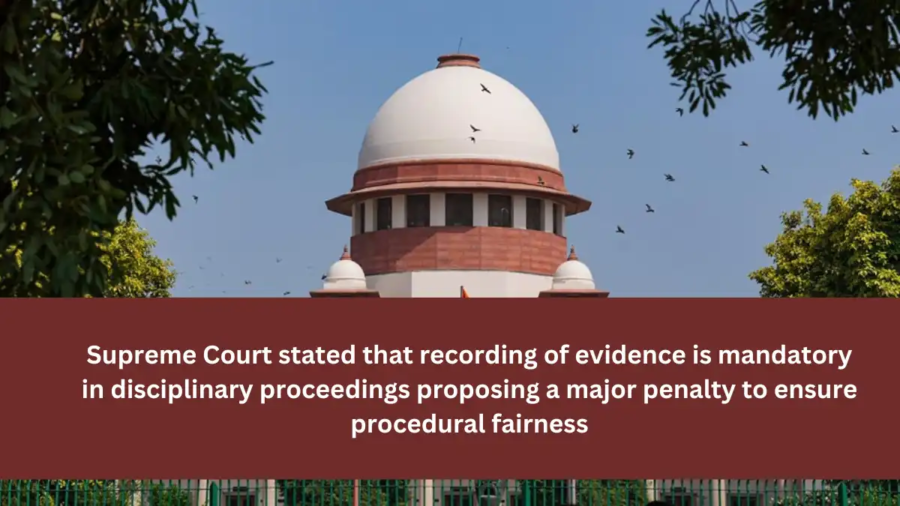Supreme Court stated that recording of evidence is mandatory in disciplinary proceedings proposing a major penalty to ensure procedural fairness
Facts of the Case:
The appellant, an Assistant Commissioner in the Commercial Tax department, faced disciplinary proceedings due to alleged irregularities in his conduct. A charge sheet was issued against him on March 5, 2012, and an inquiry report was submitted on November 29, 2012. Based on this report, the Disciplinary Authority imposed a major penalty, including a censure entry and the stoppage of two grade increments with a cumulative effect. The penalty was challenged at the Uttar Pradesh State Public Services Tribunal, which quashed the penalty order due to insufficient evidence and irrational findings. However, the High Court reinstated the penalty, leading the appellant to approach the Supreme Court for a final ruling.
Contention of the Petitioner:
The petitioner (appellant) contended that the inquiry was conducted without adhering to the mandatory procedural requirements set forth under Rule 7(3) of the Uttar Pradesh Government Servant (Discipline and Appeal) Rules, 1999. Specifically, the appellant argued that no oral evidence or witness testimonies were recorded during the inquiry, which made the proceedings unlawful and the findings irrational. The petitioner emphasized that Rule 7(3) requires that oral evidence be presented to support charges when a major penalty is being proposed. The appellant further contended that the High Court erred by reinstating the penalty despite the lack of substantial evidence.
Contention of the Respondent:
The respondent (State) defended the disciplinary proceedings, asserting that the charge sheet and inquiry report, along with documentary evidence, were sufficient to establish the charges against the appellant. The respondent argued that the lack of oral testimony did not invalidate the proceedings, as they believed the documentary evidence was adequate for proving the charges. The respondent contended that the High Court’s decision to reinstate the penalty was correct.
Court’s Observation:
The Supreme Court observed that the recording of evidence, especially oral evidence, is a mandatory requirement in disciplinary proceedings that propose a major penalty. The Court referred to its previous rulings in Roop Singh Negi v. Punjab National Bank (2009) and Nirmala J. Jhala v. State of Gujarat (2013), stressing that documentary evidence alone is insufficient unless supported by oral testimony. The Court also highlighted that the Inquiry Officer’s failure to record witness evidence rendered the proceedings non-est (invalid) in the eyes of the law.
The Court stated: “This Court in a catena of judgments has held that the recording of evidence in a disciplinary proceeding proposing charges of a major punishment is mandatory.” Furthermore, the Court noted that even in an ex-parte inquiry, it was essential for the Inquiry Officer to record witness testimonies to substantiate the charges against the appellant. The Court also mentioned that the mere reliance on documents, without examining witnesses, cannot prove the charges in a disciplinary inquiry.
Court’s Decision:
The Supreme Court concluded that the disciplinary proceedings against the appellant were vitiated due to the failure to record oral evidence as required under Rule 7(3) of the Uttar Pradesh Government Servant (Discipline and Appeal) Rules, 1999. The Court stated: “Having tested the facts of the case at hand on the touchstone of the Rules of 1999, and the law as expounded by this Court in the cases of Roop Singh Negi and Nirmala J. Jhala, we are of the firm view that the inquiry proceedings conducted against the appellant pertaining to charges punishable with major penalty, were totally vitiated and non-est in the eyes of law since no oral evidence whatsoever was recorded by the department in support of the charges.”
As a result, the Supreme Court set aside the High Court’s order, restoring the decision of the Uttar Pradesh Public Service Tribunal which had quashed the penalty. The Court further directed the appellant to be reinstated with all consequential benefits and ordered the monetary benefits to be paid within two months, failing which interest at 6% per annum would be applied. The appeal was allowed, and no costs were awarded.
Credits: Deeksha Rai



